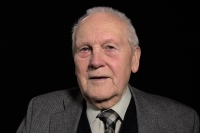We were still an occupied country and we knew what the Germans were capable of doing

Download image
Václav Majer was born on 30 September 1930 in Roztoky near Prague. He spent part of his childhood during the World War II, which was connected with many events in his hometown. The most important one was the arrival of a freight train with four thousand prisoners from the concentration camp near Litoměřice to the Roztoky railway station. Jan Najdra, the head of the local railway station, managed to delay the train for almost a whole day and the inhabitants of Roztoky started to organize help for the impoverished prisoners. People not only brought food, but the nurses of the Roztock Red Cross, together with the local doctor, cared for the seriously ill in a makeshift infirmary. It is also estimated that about three hundred prisoners managed to escape from the transport with the help of the locals. At the beginning of May, a funeral was held in the cemetery at Levý Hradec for the victims who had not survived the inhuman conditions during the transport. Václav Majer also recalls other events related to the war, the fate of the Jewish inhabitants of Roztoky, the bombing of Prague and nearby Neratovice and Kralupy nad Vltavou, and the beginning of the Prague Uprising, when thirty fighters left Roztoky to help Prague. The tense atmosphere of the end of the war is also connected with the execution of 29 German prisoners, allegedly members of the SS. The incident, which was never investigated, took place on 10 May 1945 in the Tichý Valley in Roztoky, and the remains of the executed were exhumed and transported to the German military cemetery in Cheb only in 2014. After the war, Václav Majer studied at the Teacher’s Institute and later at the Faculty of Education. While still a secondary school student, he took part in a march to Prague Castle to express support for President Beneš. Many of his memories also relate to the period after the communist coup. He describes how he perceived the way the communists consolidated their power in the 1950s, recalls the Prague Spring, the invasion of Warsaw Pact troops in August 1968 and everything that followed in the so-called normalisation period. He went to his first teaching post in 1948 in the displaced borderlands of the Ore Mountains, and also describes the situation in the post-war borderlands. He spent his compulsory military service in another border town, Cheb, at a time when Czechoslovakia was beginning to build the so-called Iron Curtain. After marrying his lifelong partner, he returned to Roztoky and taught at the local school for more than three decades. Shortly after the Velvet Revolution, he became involved in municipal politics and worked for his hometown for the next seventeen years as a member of the council for the Civic Democratic Party. During the catastrophic flood in 2002, the family of Václav Majer lost all their property. In 2023 he was living in Roztoky near Prague.
